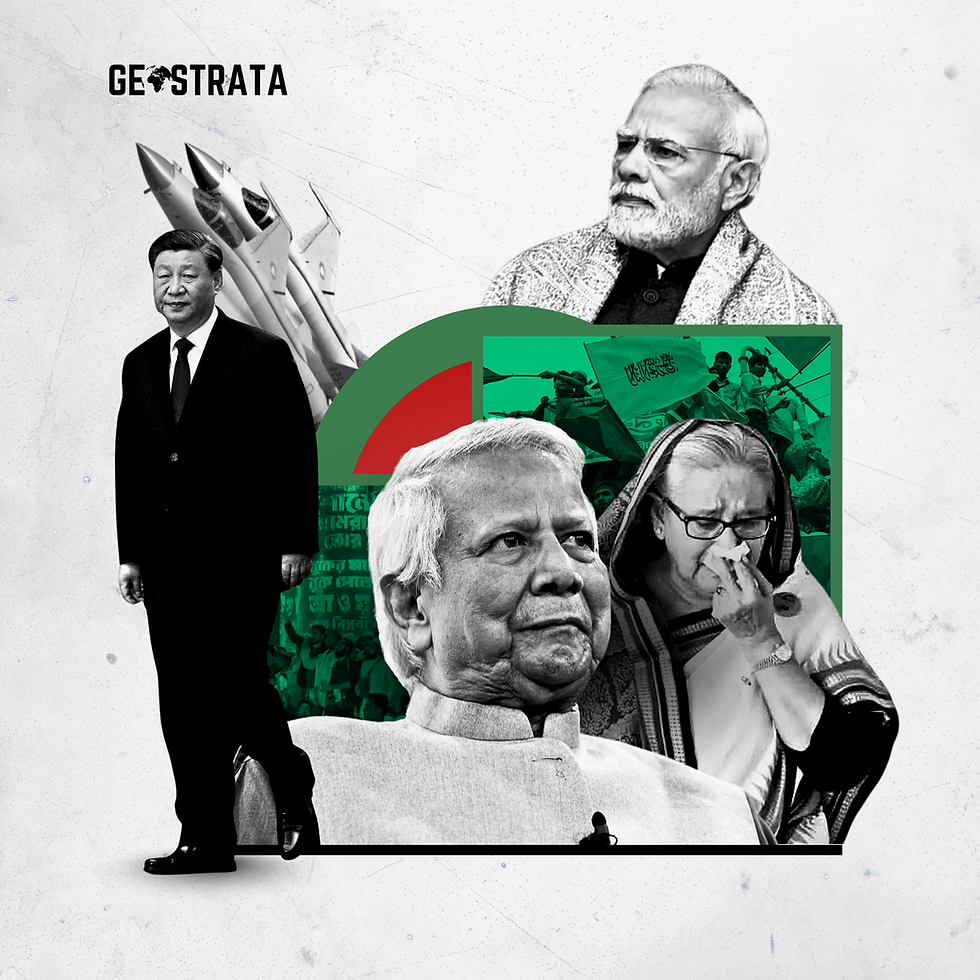WTO's 12th Ministerial Conference and India
- THE GEOSTRATA

- Jun 22, 2022
- 4 min read
Updated: Oct 31, 2022
Image Credits: WTO
The WTO’s 12th Ministerial Conference, held in Geneva, Switzerland, concluded on 17th June 2022, with some major agreements for the first time in the last 9 years. The summit brought unprecedented and spectacular success for India, which was able to resist the pressure from the western world and achieve results for itself, the developing world, and the least developed countries (LDCs). According to India’s commerce and industry minister, Mr. Piyush Goyal, India has emerged as a deal maker rather than a deal-breaker as projected by some countries, resisted the pressure from the west, and led the negotiations from the front.
The WTO’s Ministerial conference is always dominated by the developed world, and in this conference too, the agendas were as per the liking of the developed nations. India's demand for a permanent solution to public stockholding was not even tabled and was further pushed forward to the next Ministerial Conference in 2023. But still, India acted with great flexibility and was able to close in on some agreements in the closing hours of the ministerial conference. All the agreements signed by the 164 member states had Indian influence, showcasing its growing prowess, market power and influence in global politics.
The first major agreement was concerned with ensuring food security around the world. The world is facing a severe food shortage as a result of the Russian-Ukrainian conflict, as both countries were major exporters of food grains and other agricultural products.The WTO requested its member states not to restrict the supply of food and agricultural products. However, this was not made legally binding on the member states. This came after India’s decision to restrict private exports of agricultural products during these tough times. But the WTO member states decided not to restrict food exports to the World Food Programme (WFP), fighting hunger around the world. But the member states were given the privilege to restrict food exports in order to ensure food security in the domestic territory under the provision that has existed since 1948.
The second agreement is regarding fishing subsidies given all over the world. India demanded treatment under the common but differentiated responsibility attitude and demanded that developed countries do away with their fishing subsidies in the next 25 years while other developing and developed nations are allowed to continue with their subsidy programmes during this time period, at least within their exclusive economic zone. But the member states did not agree to this proposal and suggested bringing down the time frame and area guaranteed under the provision to 7 years and 12 nautical miles, respectively. This was not acceptable to India, Sri Lanka, and other developing economies in which a lot of people are still dependent on the fishing industry for their livelihood. Finally, after multiple rounds of deliberation and negotiations, an agreement was reached that was acceptable to all the parties.
The agreement was to place a check on illegal, unreported, and unregulated fishing. The WTO members decided to end subsidies for vessels engaged in these activities, keeping in mind the threat faced by marine species of mass extinction. The developing and underdeveloped nations are given a time frame of two years before executing this decision. This would enable them to enhance their fishing capabilities.
Image Credits: Bloomberg
The third agreement was something that both India and South Africa had been pushing for since October, 2022. The member states finally agreed to an IP rights waiver for vaccines for a period of 5 years. Although China opted out of the agreement as initially demanded by the United States in 2021. Though the waiver is partial as it does not include therapeutics and diagnostics, as well as temporary, it would allow for a much more effective vaccination programme in Asian, African, and South American countries. The decision regarding the IP rights waiver of COVID-19 therapeutics and diagnostics will be taken up at the next ministerial conference.
The last agreement was regarding the moratorium on customs duty on electronic transmission. The developing countries, led by India, were opposed to this as they believed 95% of the total loss occurred due to the free transmission of electronic products and services being borne by developing nations. However, the western world was opposed to this, and no agreement could be reached. Finally, the moratorium was extended up to MC’13 or 2024, where it will be discussed further. The developing nations have also sought more clarity from the WTO on what constitutes E-Transmission.
Some other developments regarding the reform of the WTO. All the members agreed on the need for reforms but couldn't sort out what reforms were needed and were important to maintain the importance and relevance of the organisation. India firmly reiterated that reforms must focus on preserving the principles of the organisation, maintain special and differential treatment, consensus-based decision making and should not worsen the already existing power imbalances even further, as quoted by PBI.
The success at Ministerial Conference 12 ensures that the conference remains relevant even in this time of uncertainty and shifting global orders. While India might not have succeeded in fully achieving its targets and objectives, it has obtained a brilliant outcome as the agreements do not harm India's interests and allow India to protect its farmers, fishermen, MSME's and poor and vulnerable people. India's commitment to global trade agreements has received much praise from the media around the world, and they are calling it a turning point for India in the WTO and global trade.
———————————————
BY ANSH TYAGI
TEAM GEOSTRATA
anshtyagi1910@gmail.com
.png)









Comments